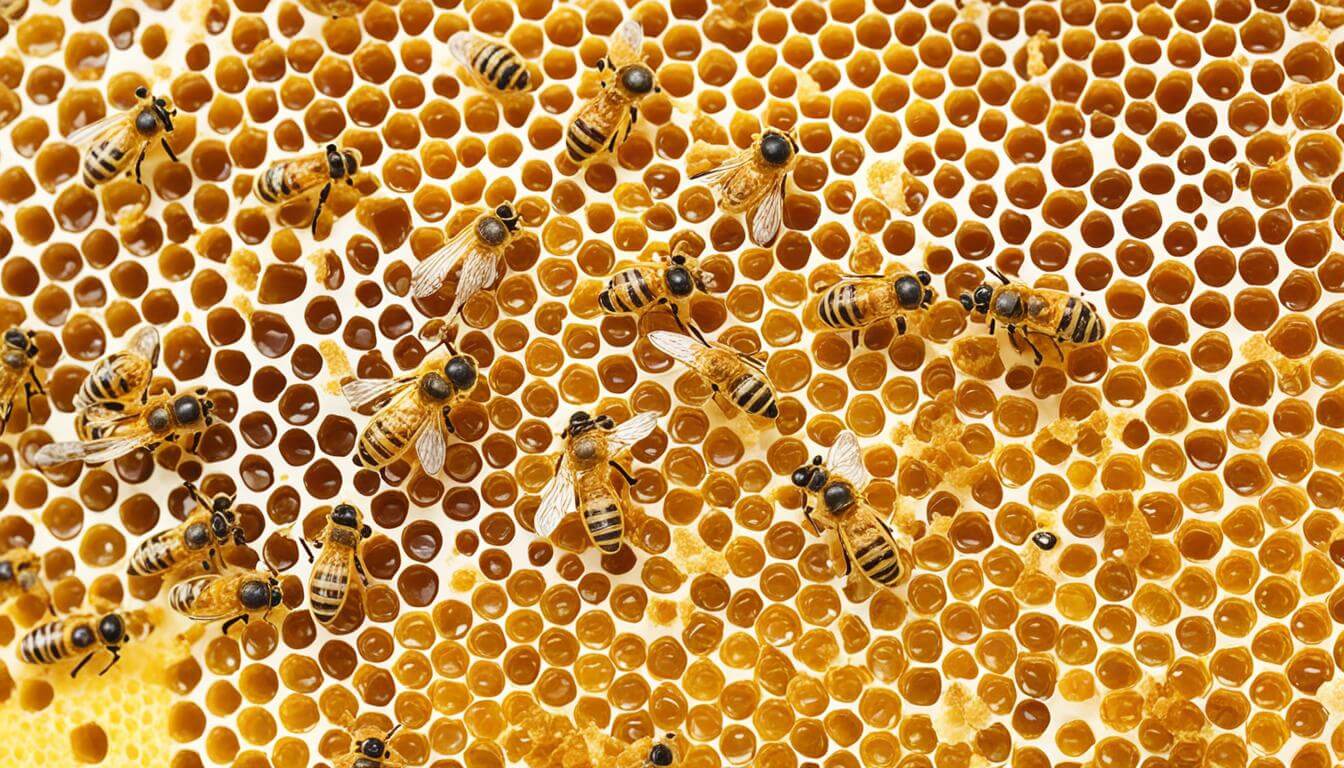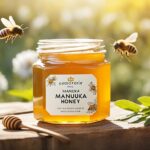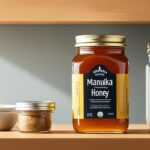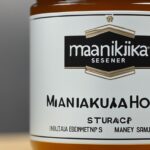In the quest for alternative medicine solutions, Manuka honey stands out as a golden treasure amid natural remedies, revered for its potent antimicrobial properties. This sweet elixir, native to New Zealand, is far from your ordinary supermarket honey. It has intrigued scientists and health enthusiasts alike with its rich, unique enzyme content that may rival even traditional medical treatments. But what exactly makes Manuka honey a formidable force against bacteria and infections? And how does this nectar of the gods encapsulate the health benefits of honey in ways that transcend the scope of gastronomic pleasure? Let’s embark on a journey to uncover the truths behind Manuka honey’s heralded status as nature’s own antibiotic.
As we dive deeper into the world of alternative medicine, we’ll demystify the compounds that confer Manuka honey’s health-promoting prowess, examine its historical medicinal use, and consider how it compares to the antibiotics populating today’s pharmacies. Whether you’re a skeptic or a convert, the following insights may just sweeten your perspective on natural remedies.
The Unique Properties of Manuka Honey
With a growing interest in natural remedies, Manuka honey has captivated health enthusiasts worldwide. Renowned for its high MGO content, Manuka honey stands out for its impressive properties which contribute to its powerful antibacterial effects. Taste is just the beginning; it’s the honey’s therapeutic benefits that truly garner attention.
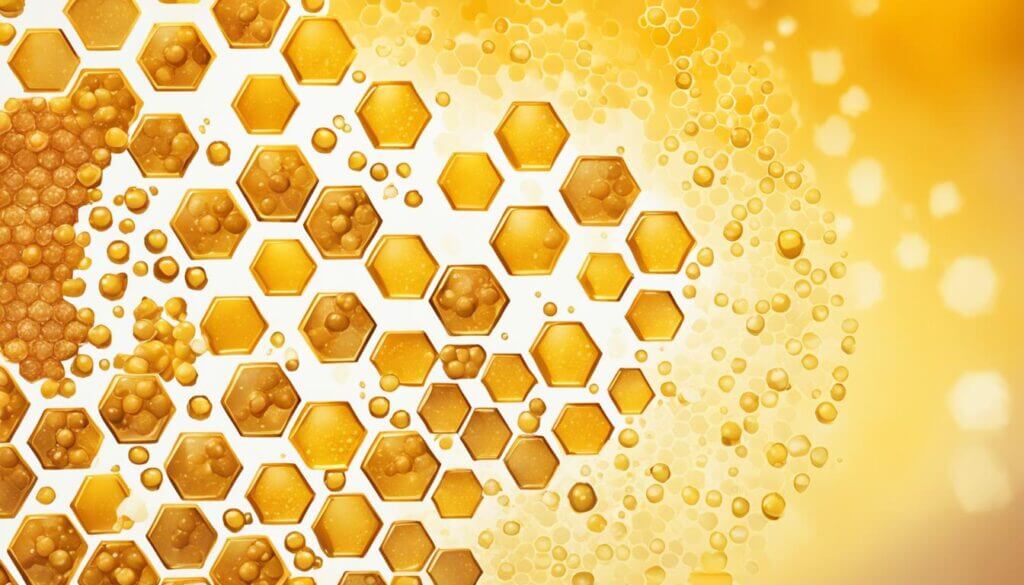
At the heart of Manuka honey’s exceptional quality is the Unique Manuka Factor (UMF), a comprehensive rating that reflects its antibacterial prowess. Consumers rely on UMF ratings to identify the potency of Manuka honey, with higher values indicating greater antibacterial strength.
Another cornerstone of Manuka honey’s antibacterial capability is its naturally occurring compound, methylglyoxal (MGO). Unlike regular honey, Manuka variants boast high MGO content which is directly related to its increased antimicrobial activity, making it a sought-after choice for people exploring adjunct natural therapies.
In addition to MGO, Manuka honey’s efficacy is partly attributed to the presence of hydrogen peroxide, a byproduct of the enzyme activity in honey that provides mild antiseptic properties. This combination of natural substances paints a clear picture of why Manuka honey is more than just a sweet treat – it’s a time-honored addition to the medicinal world.
| Component | Antibacterial Role | Common in Honey | Presence in Manuka Honey |
|---|---|---|---|
| Hydrogen Peroxide | Antiseptic | Yes | Moderate |
| MGO (Methylglyoxal) | Antimicrobial | No | High |
| UMF Rating | Measure of antibacterial strength | No | Varies (5+ to 20+) |
Research underpinning the therapeutic claims of Manuka honey is robust, with various scientific studies endorsing its benefits. As health-conscious consumers navigate towards alternatives to synthetic antibiotics, the natural potency of Manuka honey offers a beacon of hope, exemplifying the power of nature in contributing to human health and well-being.
Comparing Manuka Honey and Antibiotics
As the threat of antibiotic resistance looms large over modern medicine, the quest for alternative treatments intensifies. The potential of Manuka honey as a natural healing agent raises important questions about its efficacy in comparison to pharmaceutical antibiotics. This section will juxtapose the two, providing insights into their respective roles in healthcare.
Antibiotic Resistance: A Mounting Concern
Antibiotic resistance has become a pressing global health issue, rendering common pharmaceutical antibiotics less effective against once-treatable infections. Overuse and misuse of these drugs have led to bacteria evolving resistance to them, turning once manageable diseases into threatening health concerns. Manuka honey, revered for its potent antibacterial properties, emerges as a promising complement to existing antibiotic therapies, potentially offsetting resistance when used appropriately.
Manuka Honey as an Alternative
Natural healing philosophies often stress the importance of using substances with fewer side effects. Manuka honey’s acclaimed status in alternative medicine comes from its reported low incidence of negative reactions compared to some harsh chemicals found in standard antibiotics. It’s essential to note, though, that while Manuka honey presents a gentler alternative, its suitability varies depending on the condition being treated.
- Pros of Manuka Honey:
- Has unique antibacterial properties not found in traditional honey.
- Supported by studies suggesting efficacy in wound healing and infection management.
- May reduce inflammation and support the immune system.
- Cons of Manuka Honey:
- Not as extensively researched or regulated as pharmaceutical antibiotics.
- Effectiveness might be limited to topical applications or certain strains of bacteria.
- Higher cost compared to generic antibiotic treatments can be a barrier.
Effective implementation of Manuka honey in treatment protocols requires more in-depth research. Medical trials continue to investigate its role as either an alternative or a synergistic complement to pharmaceutical antibiotics. This exploration aims to fortify our arsenal against the ever-growing challenge of antibiotic-resistant bacteria, while ensuring patient safety remains paramount.
Decades of reliance on pharmaceutical antibiotics have shown impressive rewards in combatting myriad infections. Yet, their side effects and the alarming rise in drug-resistant bacteria necessitate a balanced approach that includes exploring natural remedies like Manuka honey. By doing so, we can pave the way to a more holistic model of care that embraces the best of both synthetic and natural healing methodologies.
Historical Use of Honey in Medicine
Unearthing the medicinal legacy of honey reveals a journey through some of the greatest civilizations known to mankind. Ancient remedies incorporated honey as a cornerstone, achieving acclaim for its capacity to heal and soothe. In the annals of traditional medicine, honey has been a staunch ally against various ailments, bearing witness to its historical antiseptic uses.

The Egyptians, revered for their advanced medicinal practices, utilized honey extensively. Historical records indicate that they employed honey in the majority of their medicinal compounds. Ebers Papyrus, one of the oldest medical texts, details honey’s role in treating skin disorders and eye diseases, showcasing its widespread therapeutic applications.
The Greeks, guided by the teachings of Hippocrates, acknowledged honey for its healing properties, especially as a salve for wounds and a fortifier of health. The influence of honey in Greek medicine is a testament to its enduring presence within traditional cure-alls. In the Roman empire, honey was integrated into daily health regimens, providing both preventive and curative benefits.
- Ancient Egyptians used honey in roughly 500 remedies for a myriad of conditions.
- Hippocrates, the famous Greek physician, prescribed honey for both systemic and topical use.
- Romans recognized honey as a versatile medicine, prescribed both internally and externally.
These illustrious traditions fostered an enduring respect for honey in medicine, a respect that continues to be influential in current understanding of natural healing practices. The historical narrative of honey as a panacea contributes to the veneration of Manuka honey today, and bolsters its reputation as a modern antiseptic derived from time-honored wisdom.
How Manuka Honey Fights Bacteria
The science behind Manuka honey’s capacity to act as a powerful ally against bacterial infections is as fascinating as it is natural. Embedded in its rich, viscous texture are potent antibacterial compounds that have been studied for their ability to disrupt harmful bacteria. This natural wonder supports the immune system and boasts anti-inflammatory properties, offering a multi-faceted approach to tackling infections.
One of the key mechanics through which Manuka honey exerts its effects is the osmotic effect. The high sugar concentration in honey draws water out from the bacteria, effectively dehydrating and inhibiting their growth. Moreover, when in contact with body fluids, Manuka honey slowly releases hydrogen peroxide, a substance known for its antimicrobial properties. This compound assists in cleansing wounds and preventing bacterial proliferation.
Furthermore, Manuka honey’s low pH levels create an acidic environment that most bacteria find inhospitable. The cumulative effect of these properties results in both bacteriostatic (inhibiting bacterial growth) and bactericidal (killing bacteria) actions, making Manuka honey a unique combatant against infection. Below is a table detailing the scientific findings on how Manuka honey supports the immune system and has anti-inflammatory effects when fighting bacteria.
| Study | Effect on Bacteria | Immune System Support | Anti-Inflammatory Action |
|---|---|---|---|
| Osmotic Effect Research | Inhibits growth by dehydration | Activates immune cell response | Reduces swelling around wounds |
| Hydrogen Peroxide Release Analysis | Kills bacteria on contact | Enhances pathogen elimination | Alleviates local inflammation |
| Acidic Environment Investigation | Prevents bacterial colonization | Strengthens skin barrier function | Minimizes inflammatory markers |
Studies have corroborated the efficacy of Manuka honey’s multifaceted approach. Its immune system support stems not only from direct bacterial interference but also from stimulating the body’s own defenses. Meanwhile, the honey’s anti-inflammatory properties ensure that tissue healing can proceed without the impediment of excess inflammation, marking it as an effective adjuvant to traditional medical treatments in the fight against bacteria.
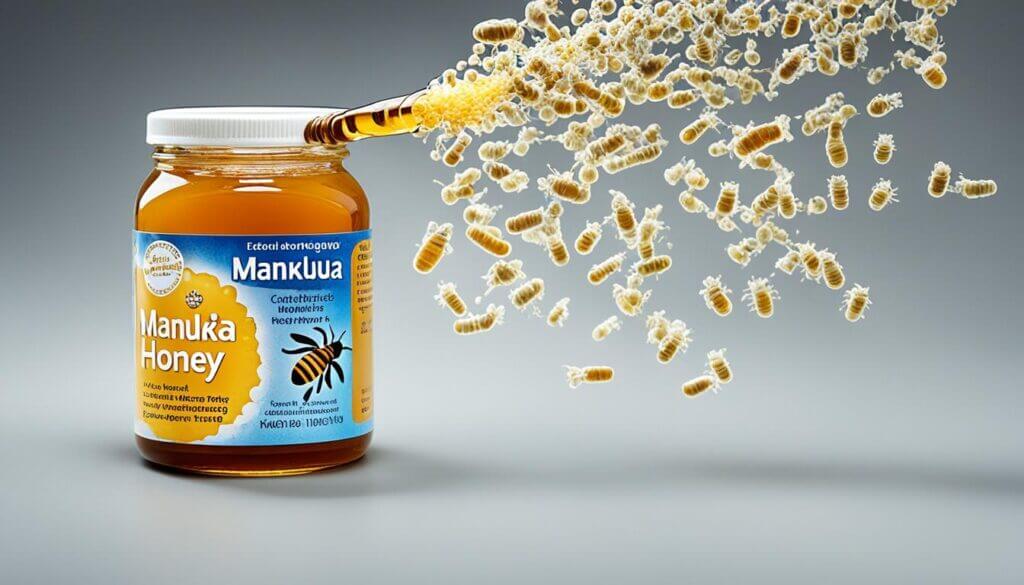
Manuka Honey and Antibiotics
The interplay between Manuka honey and pharmaceutical antibiotics has been the subject of interest due to its potential in producing synergistic effects. Research reveals that when Manuka honey is used in conjunction with traditional antibiotics, it may enhance their ability to tackle infections, presenting a promising strategy for antibiotic potentiation. This is particularly significant in the fight against bacteria such as Methicillin-resistant Staphylococcus aureus (MRSA), which is notorious for its resistance to commonly used antibiotics.
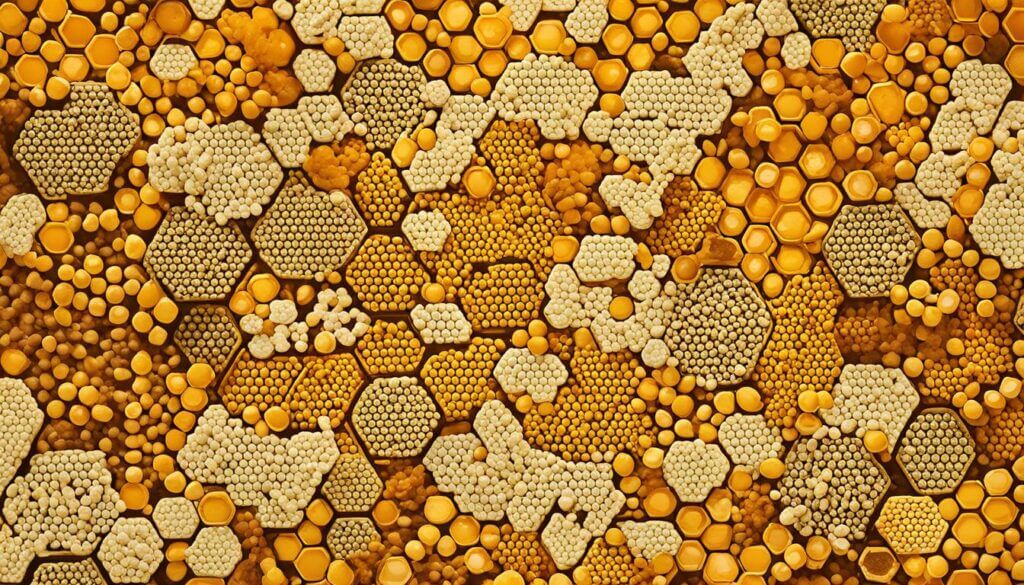
Recent case studies highlight the favorable outcomes in wound healing when Manuka honey is added to the antibiotic regimen. This includes quicker recovery times and a reduction in wound size, owing to Manuka honey’s natural anti-inflammatory properties and its ability to maintain a moist wound environment conducive to healing.
| Antibiotic | Effect Without Manuka Honey | Effect With Manuka Honey |
|---|---|---|
| Oxacillin | Reduced efficacy against MRSA | Improved action on MRSA |
| Doxycycline | Limited impact on inflammation | Enhanced anti-inflammatory effect |
| Rifampicin | Can encourage resistant strains | Less resistance observed |
The compounding advantages include not only direct antimicrobial action but also boosting the overall immune response. Testimonials from healthcare professionals have observed these synergistic effects, advocating for Manuka honey’s role in integrated care approaches. With antibiotic resistance on the rise, the potential for natural agents like Manuka honey to potentiate antibiotics offers a ray of hope in evolving medical treatments.
Choosing the Right Manuka Honey for Therapeutic Use
When on the hunt for authentic Manuka honey of a therapeutic grade, discerning consumers need to navigate a sea of labels and claims. It’s vital to understand the indicators of purity and potency to ensure you’re investing in a quality product that delivers the health benefits you’re seeking. Let’s explore the key factors every shopper should consider.
- UMF Certification: The Unique Manuka Factor (UMF) is a global standard identifying and rating the potency of Manuka honey. It measures not just the MGO (methylglyoxal) concentration, but also other key compounds like leptosperin and dihydroxyacetone. Look for a UMF rating of 10+ or higher; this indicates it’s of therapeutic quality.
- Quality Assurance: Always check for the UMF trademark on the label, which signifies quality assurance and that the honey has been independently tested to meet set standards.
- Sourcing: True Manuka honey originates from New Zealand, derived from the nectar of the Manuka bush. Verify the geographical source to ensure authenticity.
Understanding these three pillars will guide you towards a genuine Manuka honey experience and help you reap the full spectrum of its natural benefits.
| UMF Rating | Indicative MGO Content | Therapeutic Potential |
|---|---|---|
| 10+ | 263mg/kg | Minimum recommended for medicinal use |
| 15+ | 514mg/kg | Strong potency, suited for specific health purposes |
| 20+ | 829mg/kg | Superior levels of therapeutic properties |
Remember, embarking on your therapeutic journey with Manuka honey starts with making an informed choice. Empower yourself with knowledge on UMF certification and quality assurance so you can select the best Manuka honey that promises both purity and potency.
Safe Consumption and Potential Allergies
Embarking on a journey with Manuka honey for its health benefits warrants attention to dietary precautions and awareness about honey allergy signs. While Manuka honey is celebrated for its therapeutic properties, understanding the safe dosage and health considerations is crucial for a positive experience.
For newcomers to Manuka honey, it’s advisable to start with a small quantity. Incremental increases allow one to monitor the body’s response, especially for those unaccustomed to its potent enzymes and pollen components. This conservative approach is particularly important due to the possibility of allergies, which can manifest as mild to severe reactions. Common honey allergy signs include skin rashes, itching, swelling, or respiratory issues.
When incorporating Manuka honey into your diet, consult with healthcare professionals, especially if there are pre-existing health conditions or ongoing medication regimens. They can provide personalized guidance on safe dosage and help integrate it safely alongside your current treatments. Here is a small guide to help recognize potential allergy symptoms and the general recommended dosages:
| Allergy Symptom | Description | Action to Take |
|---|---|---|
| Skin Reactions | Redness, hives, or itching | Discontinue use and consult a doctor |
| Respiratory Issues | Difficulty breathing or wheezing | Seek immediate medical attention |
| Gastrointestinal Discomfort | Nausea, vomiting, or diarrhea | Mild reactions often subside; consult a doctor if severe |
Beyond these precautions, it’s also critical to ensure you’re choosing a high-quality Manuka honey. Certifications such as the UMF or MGO rating can serve as indicators of purity and potency, reducing the likelihood of impurities that may aggravate sensitivities.
Keeping these guidelines in mind allows you to enjoy the myriad of benefits Manuka honey offers. It’s pivotal, however, to remember that moderation is key, and being attuned to your body’s signals is the best way to prevent adverse reactions.
User Testimonials and Medical Endorsements
As we’ve traversed the honey-laden landscape of Manuka’s health properties, it’s essential to circle back to the voices of those whose lives have been sweetened by its touch. Personal experiences serve as a cornerstone of Manuka honey’s reputation in natural medicine. Individuals across the United States have shared stirring narratives of how Manuka honey has integrated seamlessly into their wellness routines, offering relief and results where other remedies fell short. These real-life benefits span from improved skin conditions to the swift healing of stubborn infections – a testament to the potency of this natural elixir.
Backing the chorus of contented users are the authoritative tones of health practitioner recommendations. Physicians and researchers have begun to bear witness to Manuka honey’s medicinal potency, echoing sentiments of approval through their endorsements. The intersection between age-old wisdom and contemporary science becomes particularly compelling when medical professionals affirm the role of Manuka honey as a complementary treatment, not merely for its holistic allure but for its tangible contributions to antibiotic regimens, especially in the fight against resistant strains of bacteria.
In essence, the collective acclaim from satisfied users and respected doctors forges a compelling case for Manuka honey’s place at the table of therapeutic alternatives. These endorsements and personal accounts go beyond anecdotal evidence, offering a glimpse into a future where natural remedies such as Manuka honey are not outsiders but integral players in our healthcare narratives.
